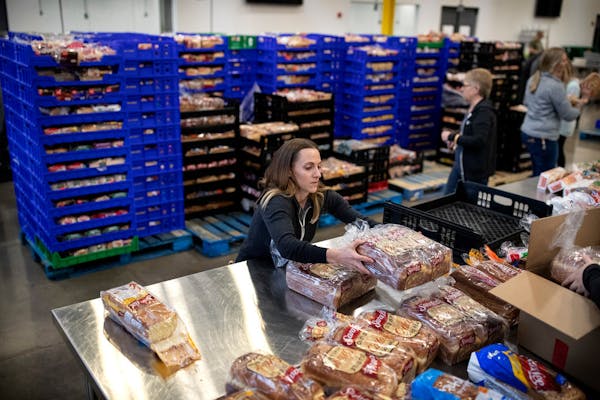WASHINGTON – The union that represents the majority of America's meatpackers and food processors called Thursday for national guidelines to protect those workers from COVID-19 outbreaks that have led to 13 deaths, hundreds of cases of COVID-19 and thousands of exposures.
The explosion of the new coronavirus in an industry where employees often work shoulder to shoulder has caused temporary closures of 13 plants across the country, including in Minnesota.
The United Food and Commercial Workers International Union (UFCW) said the country's elected leaders must guarantee access to personal protective equipment. They also need to slow down production lines to spread out employees in order to maintain social distancing and to increase testing for the virus that has spawned a worldwide pandemic.
Workers testing positive must be isolated, union president Marc Perrone added.
Unless the government takes action with "clear and concise guidelines," Perrone said, "more plants will close."
He predicted that the virus would return in the fall, making an adequate national response plan necessary.
The White House referred a request for comment on the union's desire for national guidelines to the U.S. Department of Agriculture (USDA), which did not respond.
The UFCW was particularly critical of the agriculture department's recent grant of waivers to restricted processing speeds at poultry plants, a move the union says forced employees to work in closer proximity and put them at risk of exposure to COVID-19.
USDA "gave out more [waivers] this month than they did in all of 2019," UFCW International Vice President for Meatpacking Mark Lauritsen said.
In recent days, Minnesota's congressional delegation has grown increasingly active in its call to protect workers in the pork, beef and poultry industries who make up a significant part of the state's rural workforce.
Rep. Collin Peterson, chairman of the House Agriculture Committee, wrote to Vice President Mike Pence and the national coronavirus task force Thursday recommending a series of steps. They included federal guidance on best practices for avoiding COVID-19 transmission in pork processing plants, as well as federal meat inspectors in plants, more testing of employees, and adequate protective gear.
In a statement to the Star Tribune, Republican Rep. Jim Hagedorn, an agriculture committee member whose district includes the recently closed JBS plant in Worthington, offered a promise.
"My staff and I will work with any and all to help facilitate the reopening of the JBS plant," he said. "I will also continue to monitor the operations and attend to any needs of southern Minnesota's other meat processing facilities."
Democratic Rep. Angie Craig, another Minnesotan on the agriculture committee, stressed a countrywide approach.
"We need a national strategy to ensure that workers in our processing facilities have temperature checks, as well as access to metabolic and serologic testing so that we know for sure who can safely be at work," Craig said in a statement.
U.S. Senators Amy Klobuchar and Tina Smith of Minnesota were among 36 Democratic senators who signed an April 21 letter to Pence and several government agency heads urging a more aggressive approach to "testing and tracing of those exposed to the virus in order to stop the spread."
How plant closures will affect beef, pork and poultry availability and prices remains unknown. However, shutdowns already have hurt hog producers who have no place to sell their stock and now face the prospect of euthanizing large numbers of animals.
Equally unclear is whether earlier use of massive testing and distancing protocols could have prevented the spread of COVID-19 well enough to keep plants operating at full capacity.
A slowdown in production now seems inevitable to contain spread of the virus, said Matt Utecht, who leads Local 663 of the UFCW at Worthington's JBS plant.
"If JBS reopens," Utecht said, "it can't be as it was."
Utecht generally praised JBS' attempts to address the pandemic.
The company did a good job of providing personal protective equipment, he said, and it instituted an aggressive deep cleaning and sanitizing program.
Rhonda Trevino, a UFCW worker at Cargill's beef processing facility in Texas, said the Minnesota-based company went to extraordinary lengths to try to separate employees in its cafeteria. Sheets of neoprene separated workers on the production line, Trevino said.
All of it helps, but nothing, it seems, completely contains the virus.
"The problem is as simple as plant design," explained Utecht. Meat packing and processing plants "are not designed to avoid virus transfer. They are designed for people to work shoulder-to-shoulder."
Jim Spencer • 202-662-7432

Want to share info with the Star Tribune? How to do it securely

'Safe recovery sites' would offer syringes, naloxone and more to people using drugs. The plan could be in peril.
New Minnesota GOP leaders seek peace with party's anti-establishment wing

Who is Republican Lisa Demuth, Minnesota's first House speaker of color?

